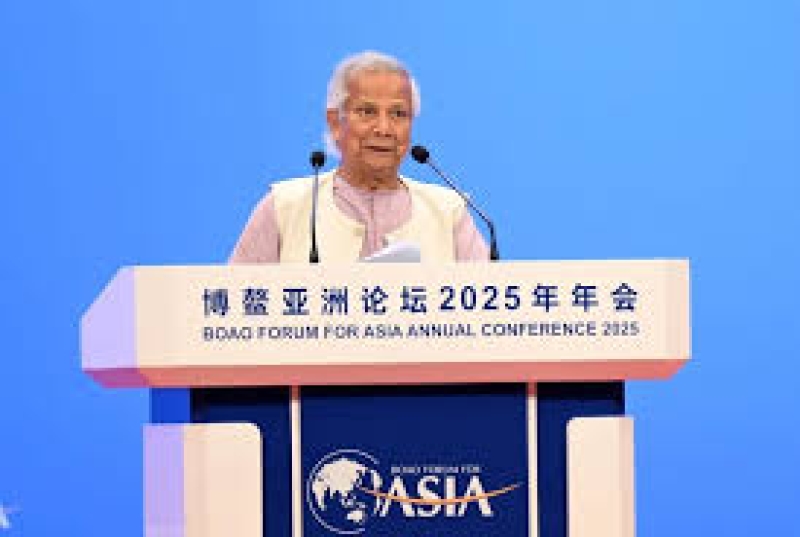- Eid-ul-Fitr in Saudi Arabia today (Sunday) |
- Landmine blast near Bandarban border, Bangladeshi injured |
- Most Bangladesh cities unprepared for earthquakes, says IPD |
- Dhaka’s footpaths abuzz with low-income Eid shoppers |
- Dr Yunus back home ending his hugely successful China visit |
Dr. Yunus Urges Strengthened Asian Cooperation for Shared Future

Chief Adviser Prof. Muhammad Yunus emphasized the need for Asia to strengthen cooperation in four key areas—finance, trade, food and agriculture, and technology—during his speech at the Boao Forum for Asia Annual Conference on Wednesday.
"In this rapidly changing world, the destinies of Asian nations are intertwined," Yunus said. "We must chart a clear roadmap for a shared future and prosperity."
The conference, themed "Asia in the Changing World: Towards a Shared Future," featured notable speakers including Zhang Jun, Secretary General of Boao Forum for Asia; former UN Secretary-General Ban Ki-moon; and Ding Xuexiang, Executive Vice Premier of China.
Prof. Yunus highlighted Bangladesh's ongoing challenges, notably hosting over 1.2 million Rohingya refugees from Myanmar. He urged Asian leaders to collaborate on ensuring the safe and dignified repatriation of the refugees, pointing out that the crisis in Myanmar continues to threaten regional stability.
The Chief Adviser also warned of the destabilizing impact of wars and conflicts, citing the ongoing genocide in Gaza and the war in Ukraine, which have disrupted global supply chains.
"Asia must create a sustainable financing mechanism to address its growing demands and challenges," Yunus stated, urging greater investment in infrastructure, economic diversification, and responsible financing. He also pointed out the detrimental impact of corruption and illicit financial flows, which cost developing countries an estimated 1 trillion US dollars annually.
On food security, Yunus stressed the importance of strengthening food supply chains and promoting resource-efficient farming. "We must reduce import reliance and strive for self-sufficiency," he said, calling for the adoption of tech-based sustainable agricultural solutions and innovation in climate-smart farming.
The Chief Adviser underscored the need to build a robust tech ecosystem that is inclusive and collaborative. "We need to share knowledge, data, and invest in technology incubation to drive progress," he noted, emphasizing the role of youth and intellectual resources in shaping a new civilization focused on sustainability.
Dr. Yunus also discussed the broader global challenges, including rising geopolitical tensions, climate change, and growing humanitarian crises. He pointed out that Asia, home to 60% of the global population and 55% of global GDP, is at the center of these challenges and must work together for effective solutions.
He also advocated for a shift toward sustainable economic models that prioritize people and the planet over profits. "The climate crisis poses an existential threat to humanity," Yunus said, noting that climate-vulnerable countries like Bangladesh are struggling to balance disaster response with investments in economic growth.
Lastly, Yunus called for greater gender equality, urging countries to remove barriers to women's economic empowerment and ensure equal access to opportunities. "Investing in human capital and providing access to finance for entrepreneurship will shape Asia's future competitiveness," he concluded.

